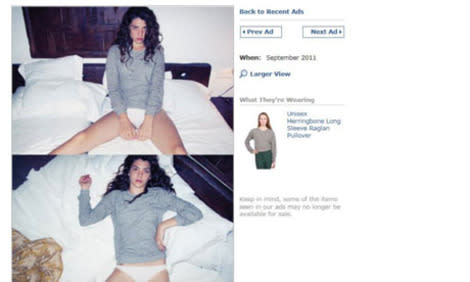UK Bans American Apparel Ad. Are They Pornographic or Just Graphic?

American Apparel is under fire again. The UK's Advertising Standard Authority has banned a series of photos appearing on the company's website. Labeled "pornographic and exploitative" in a complaint by an anonymous consumer, the eight ads appearing on AmericanApparel.net, feature a woman in various stages of undress wearing items sold at the national chain. Some feature exposed breasts, while others portray models lying in unmade beds-a trademark pose of the brand.
Here in the U.S., American Apparel is no stranger to controversy. Between questionably degrading marketing campaigns, outcries from bloggers, and lawsuits from former models, employees and Woody Allen, the company is used to being a bullseye for critics. In fact, one their ads was under scrutiny in England for portraying a too-young looking model back in 2009.
Here's where it gets complicated. According to the ASA, one of the points against the latest set of ads which debuted on the website in October, is that models are too "real-looking". Because of the sexual nature of the poses there's an "ametuerish" or "voyeuristic" aspect which comes off as exploitative, according to the ASA.
Conversely, the ASA is notorious for banning other types of ads for just the opposite reason. Multiple L'Oreal cosmetic campaigns, featuring supermodels like Christy Turlington and superstars like Julia Roberts and Rachel Weisz, were banned for looking too unreal. Accused of retouching to unrealistic length, beauty advertising has had to rethink their approach of using flawless looking supermodels.
So what you've got is a strange set of rules: women can't be too unrealistic if they're selling beauty, and they can't be too realistic if they're selling sex.
American Apparel denied an wrong-doing in this latest ban, according to the ASA report. "They said the approach was not graphic, explicit or pornographic but was designed to show a range of different images of people that were natural, not posed and real."
These ads (which you can view here because we certainly can't post them all) are definitely NSFW and towing the line between fetish photos and guerilla branding. But are they any more exploitative than Gisele's most recent totally topless ad for Versace or the Kardashian's excessively bare-skinned jeans campaign?
Is it simply because famous people are allowed to be sexy, while real women aren't? Are we so used to seeing retouched women in fantasy settings, that real-looking women in sexual poses makes us uncomfortable? Or has American Apparel simply crossed the line with these hyper-revealing images?
Related:
10 reasons people hate American Apparel
Dov Charney sued for sexual harassment
Kardashians go topless for jeans ad
Blogger feuds with American Apparel
